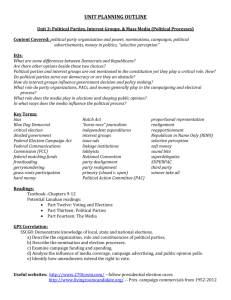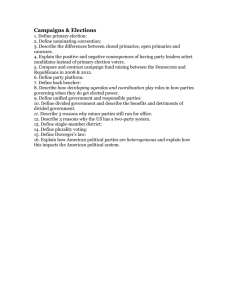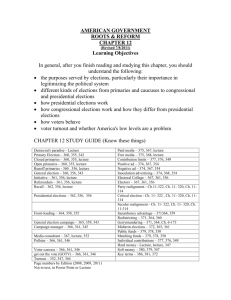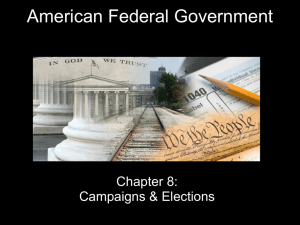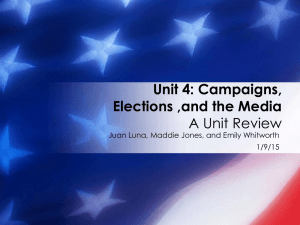Campaigns, Elections, and the Media
advertisement
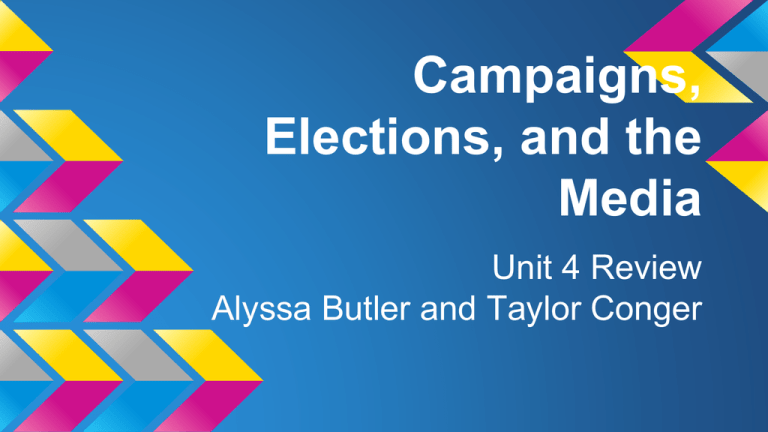
Campaigns, Elections, and the Media Unit 4 Review Alyssa Butler and Taylor Conger Voting Behavior Who votes? the educated white collar wealthy older majority races women religiously active union membership married located in geographic politically active area strong party ID Voting Restrictions U.S. suffrage is not universal, you cannot vote if you are: -Under 18 -A felon -A mental patient Amendments & Laws: 15th Amendment: Abolished race restrictions 17th Amendment: Citizens can choose senators in direct primary. 19th Amendment: Abolished gender restrictions 23rd Amendment: Allowed residents of D.C. to vote. 26th Amendment: Allowed 18 year olds to vote Civil Rights Act of 1965 and Voting Rights Act of 1965: got rid of poll taxes McGovern-Fraser Commission: a commission formed at the 1968 Democratic convention in response to demands for reform by minorities and other groups who sought better representation Federal Election Campaign Act: A law passed in 1974 for reforming campaign finances. The act created the Federal Election Commission, providing public financing for presidential primaries and general elections, limited presidential campaign spending, required disclosure, and attempted to limit contributions Motor Voter Act- Passed in 1993, this act went into effect for the 1996 election. It requires states to permit people to register to vote at the same time they apply for drivers’ licenses Voter Rights Recall: Kick someone out of office. Referendum: Gaining people’s approval on state legislation. Initiative: People initiate measure and put it on the ballot. Road to the White House Exploration Announcement Primaries Nominating Presidential Campaign Financing: The Federal Election Reform Act of 1974 placed legal limits on campaign funding. Bipartisan Campaign Reform Act of 2002: designed to end the use of soft money. Soft Money Contributions: No limits on funds contributed. McCutcheon vs. FEC: meant to limit in hard money funding to $123,200. Types of Primaries Closed primary- Elections to select party nominees in which people who have registered in advance with the party can vote for that party’s candidates, thus encouraging greater party loyalty Frontloading- recent pattern of states holding primaries early in order to maximize their media attention and political influence. Three‐fourths of the presidential primaries are now held between February and mid‐March. Critics argue that candidates devote too much time to Iowa and New Hampshire. Although both states are relatively small, they play a crucial role in generating media attention. Presidential primary- elections in which voters in a state vote for a candidate ( or delegates pledged to him or her). Most delegates to the national party conventions are chosen this way national primary- a proposal by the critics of the caucuses and presidential primaries systems who would replace these electoral methods with a nationwide primary held early in the election year regional primaries- a proposal by critics of the caucuses and presidential primaries to replace these electoral methods with a series of primaries held in each geographic region Types of Elections and Voting Elections: Plurality election- the candidate with the largest number of votes wins, even if it is not a 50% majority General election- a re elections in which the voters choose from among all the candidates nominated by political parties or running as independents. Special elections are held whenever an issue must be decided by voters before a primary or general election is held, for example, to fill a vacancy in the Senate. Special Election- Elections called by state governments to fill the vacancies that occur when a member of the House of Representatives dies or resigns before the biennial election. Election Day: The Tuesday following the first Monday in November, generally November 8th. Voting: policy voting- voting that occurs when electoral choices are made on the basis of the voters’ policy preferences and on the basis of where the candidates stand on policy issues. For the voter, policy voting is hard work retrospective voting- a theory of voting in which voters essentially ask this simple question: “What have you done for me lately?” Role of the Media -Informs the public -Influences public opinion -Gives the citizens a link to the government -Decides what is the main subject of national importance. Media Ownership & Government Regulation: -Technical Regulation: regulations in radio, television, telephone, telegraph, cable, and satellite. Media Vocab media events- events purposely staged for the media that nonetheless look spontaneous. In keeping with politics as theater, media events can be stage by individuals, groups, and government officials, especially presidents press conferences- meetings of public officials with reporters investigative journalism- the use of detective-like reporting to unearth scandals, scams, and schemes, putting reporters in adversarial relationships with political leaders narrowcasting- as opposed to the traditional “broadcasting” the appeal to a narrow, particular audience by channels such as ESPN, MTV, AND C-SPAN, which focus on a narrow, particular interest trial balloons- an intentional news leak for the purpose of assessing the political reaction sound bites- short video clips of approximately 15 seconds, which are typically all that is shown from a politician’s speech or activities on the nightly television shows mass media- Television, radio, newspapers, magazines, and other means of popular communication Other Vocab campaign strategy- the master game plan candidates lay out to guide their electoral campaign caucus (state party)- A meeting of all state party leaders for selecting delegates to the national party convention. They are usually organized as a pyramid superdelegates- national party leaders who automatically get a delegate slot at the Democratic national party convention selective perception- the phenomenon that people often pay the most attention to things they already agree with and interpret them according to their own predispositions legitimacy- a characterization of elections by political scientists meaning that they are almost universally accepted as a fair and free method of selecting political leaders. When legitimacy is high, as in the US, even the losers accept the results peacefully Vocab Continued initiative petition- a process permitted in some states whereby voters may put proposed changes in the state constitution to a vote if sufficient signatures are obtained on petitions calling for such a referendum civic duty- the belief that in order to support democratic government, a citizen should always vote mandate theory of elections- the idea that the winning candidate has a mandate from the people to carry out his or her platforms and politics. Politicians like the theory better than political scientists d0 single-member district- an electoral district or constituency having a single representative in a legislative body horse-race journalism- a type of political journalism that focuses on polling data, public perception instead of candidate policy 527 Group- a tax-exempt organization created for the purpose of influencing the election or appointment of public officials


